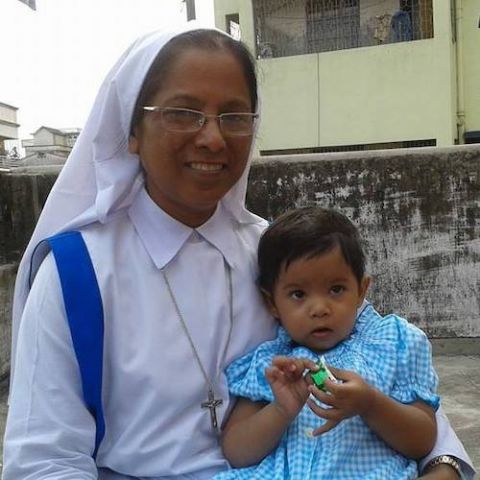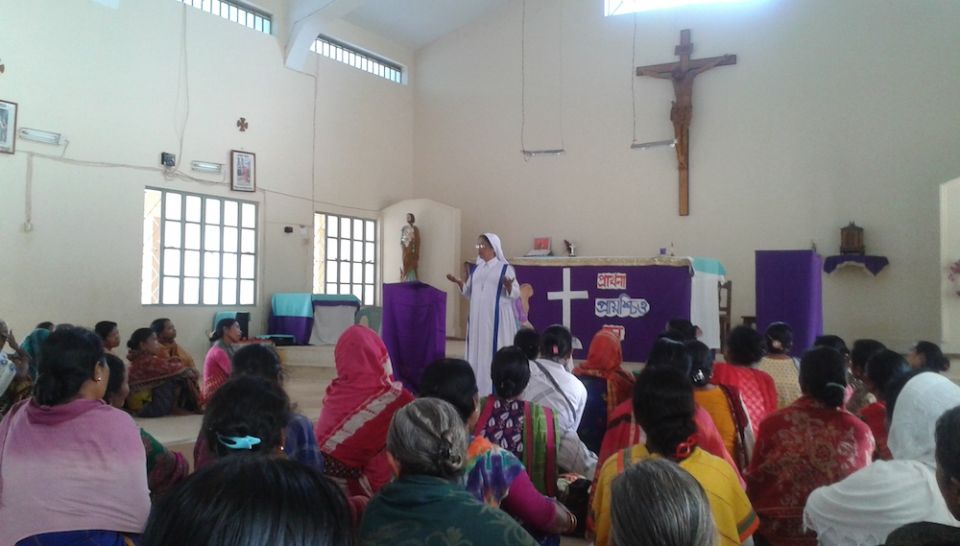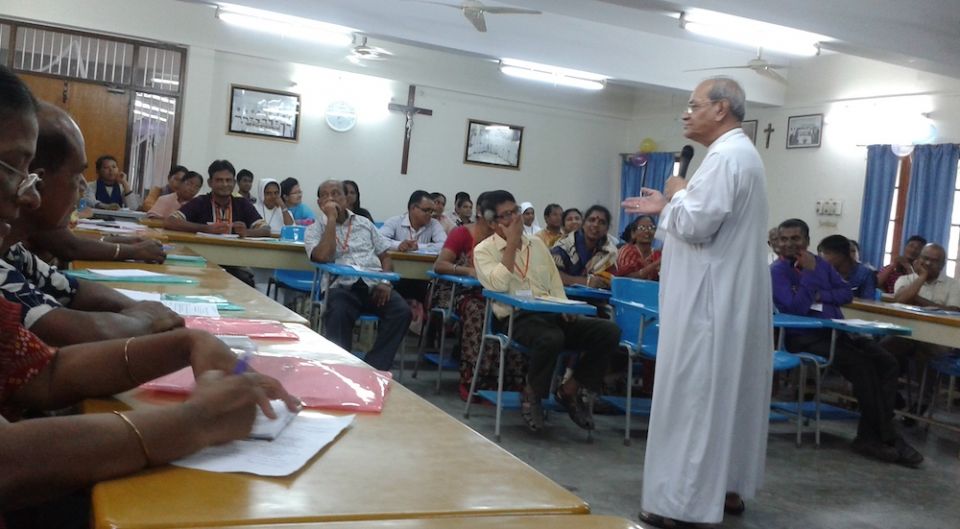Mary Mitali 4 workshop c.JPG
Dhaka, Bangladesh — Sr. Mary Mitali, a member of the Associates of Mary, Queen of the Apostles, has helped transform thousands of laypeople's lives in her six years providing training through her job as office secretary and trainer with the Episcopal Commission for the Laity.
Before attending training, there was a distance between laypeople and religious priests and nuns, but now, laypeople and religious work closely together, Mitali said. The commission also helps laypeople to be a witness of Christ in this Muslim-majority country, where Christians make up less than 1% of the population of 165 million.
The commission's objective is to promote and coordinate the apostolate of the laity, especially in matters respecting the Christian life of the laypeople; to urge laypeople to participate in the life and mission of the church; and to foster action among laypeople for catechetical instruction in liturgical and sacramental life as well as in works of mercy, charity and social development.
Mitali, 57, said the commission, which was created in 2004, also holds seminars and workshops for the formation of laypeople about their Christian lives and apostolate and their participation in the social, economic, political and cultural life in Bangladesh. The commission also holds seminars and workshops on the promotion of women in the family, in the church and in the larger Christian and Bangladesh society; trains people for lay ministries in the church; and promotes small Christian communities at the village levels.
As a result, the local church is empowering and increasing the participation of laypeople and growing leadership among men and women.
Advertisement
Advertisement
GSR: What do you do at the Episcopal Commission for the Laity?
Mitali: The commission has one program, the Christian Communities Program, and two desks, one for women and one for lay association and organization. The Christian Communities Program promotes small Christian communities at the grassroots level of villages and neighborhood communities and other special groups. The desk for women promotes the dignity of women, their vocation and role in the church and in society, and their special service to others. The desk of lay association and organization works for relevance for the life and mission of Christian laity and provides spiritual guidance. It also gathers social leaders and provides church teachings.
Mary Mitali 1 with child cc.jpg

As an office secretary and a trainer, I mainly plan and implement training with the help of the chairman and secretary of the commission. Annually, we conduct five or six national workshops for members of the laity from all over Bangladesh. I contact each of the country's eight dioceses for participants.
After they complete the workshop, participants commit to conducting similar seminars in their dioceses with the help of our fund. Later, they send us reports. We use the help of some Catholic youths as volunteers. In the future, they will be parents and leaders of society.
Parish priests help us pull together participant lists. We provide transportation and accommodation for each five-day-long workshop. I buy training materials. In addition to arranging and managing the workshops, I also teach catechesis in the workshops.
What kind of training do you provide that transforms lives of members of the laity?
We provide training on catechesis, the Bible, Christian leadership, the social teachings of the church, the vocation of laypeople, pastoral guidelines of local churches, Christian movements, theology, the spirituality of Mary, mission, etc. New believers especially like catechesis because they can learn many unknown things from the workshop.
Classes are provided by Cardinal Patrick D'Rozario, bishops and expert priests and nuns with various skills. Generally, laypeople are not much aware about the Bible, church teachings, and missionary work. By getting our training, they can understand the importance of these and can actively take part in church activities.
Mary Mitali 2 workshop c.jpg

Our training helps positively change laypeople. By receiving our training, they follow church teachings, and they also can teach others and be a witness to people of other faiths. Participants get inspiration from our classes. Beside transforming themselves, they also transform other people.
Laypeople come to the church through your workshop. Do you enjoy your ministry work?
Church members get involved with church activity. To see this transformation, I feel really great. I enjoy my work. Being a Catholic nun, when I see I am contributing to laypeople's lives and they are getting light from our workshop, I get joy in my religious life. To make enlightened human beings is our main responsibility.
Often, I notice, participants come to us like an empty jar, and after they receive our workshop, they return as a jar full of wisdom and knowledge. During the workshops, I stay with participants 24 hours a day. I become happier when I see that our training works. They make the church stronger.
I also want to talk about an important part of this ministry. Our training gives the message to laypeople about how they can lead a beautiful and ideal life. We want our laypeople to find happiness on Earth and in heaven by leading a perfect Christian life. We do believe that laypeople get consciousness from us. We do follow up with those who received training so they spread their learning to others.
"To make enlightened human beings is our main responsibility."
—Sr. Mary Mitali
What kinds of challenges do you face in this ministry, and how do you solve them?
Nowadays, funding is a big challenge. Because we are a poor country, most of the participants cannot afford the traveling cost. Additionally, we have to manage food and accommodations. After the Gulshan café attack on July 1, 2016, where 29 people were killed by Islamist militants, including 17 foreigners, the government stopped all foreign money coming in for religious purposes. So funding is a big challenge for us. But we take a very small contribution from participants, and this is how we are covering it. We also get bishops' support for funding.
How do you involve women in your ministry?
While the Episcopal Commission for the Laity was created in 2004, the desk for women was not. Church leaders realized the importance of a desk for women, and later it was created.
Through the desk, we observe International Women's Day and various trainings. Under our desk's guidelines, each of the country's parishes marks International Women's Day, which makes women aware of their rights. They can understand what is their vocation and role in the church and in society, their special service to others. We teach them about the church, where women can contribute more and about women in the holy Bible.
Mary Mitali 5 International Women's Day c.JPG
To empower them, we bring in some successful female leaders to speak with them. After getting our training, many women contribute in the church. Many are involved in their parish councils and other social organizations as leaders, and some become entrepreneurs. Instead of staying at home, many women work outside of home and contribute to their families, church and society. Now, women are getting involved in volunteer work and using their talents.
Do you want to say anything else?
The desk of lay association and organization gathers social leaders of the Christian community. Nationally, we conduct a training for them. In the training, leaders of Christian associations and welfare societies as well as Christian leaders of local governments join.
We teach them how they can relate church values and teachings in their activities. Because in this Muslim-majority country, we have the opportunity to be witnesses to people of other faiths by showing them Christian behavior and teachings.
We discuss with them Pope Francis' teachings and guidelines. In our latest training, we focused on Laudato Si' so that they can better take care of the environment. With the help and active participation of laypeople, the Bangladeshi Catholic church has planted 400,000 trees so far, and Caritas Bangladesh has planted 300,000 trees so far because of Laudato Si'. I think it is a great achievement of the church.
At the end, I want to say that if participants receive our teachings aptly and can practice in their lives, our church would be a more enlightened and participatory church.
Mary Mitali 3 workshop c.jpg

Like what you're reading? Sign up for GSR e-newsletters!


